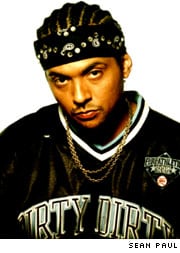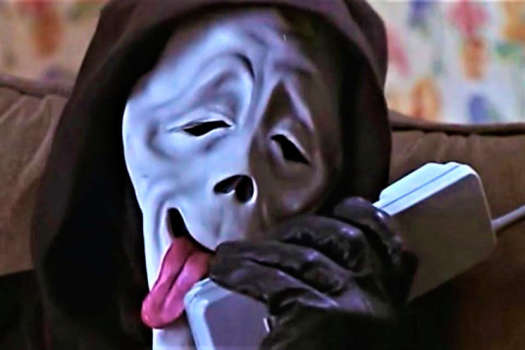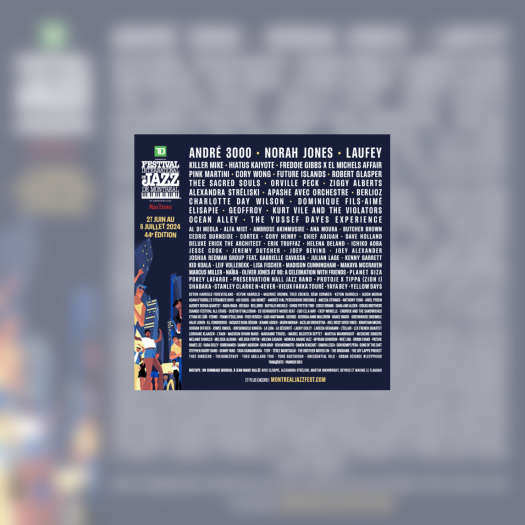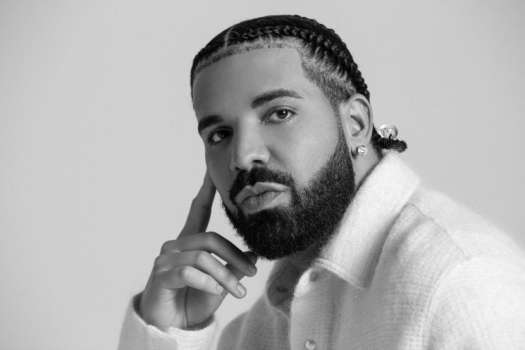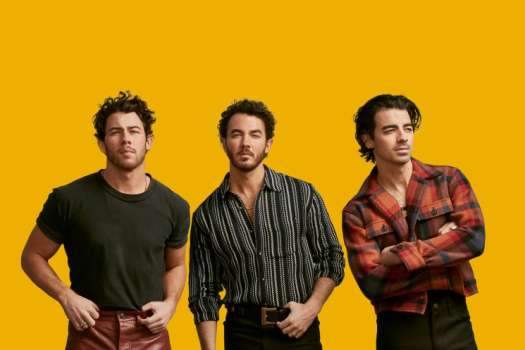Cottage country and Caribbean festivals. If you had to define Canada at midsummer, you could do worse than start with those two institutions, both offering an annual escape from our workaday routines. Come the frosty gales of fall, our sun-soaked cabin getaways will be but a distant memory, but for those who attend events like Toronto's Caribana, Jamaican music will make the sun shine all year long. 2003 is only half over, but this much is already clear: this is the year of dancehall.
Long a mere exotic ornament in the North American soundscape, digital reggae seems to be everywhere this year, from the saccharine loverman poses of Wayne Wonder to the hardcore street tunes of Sizzla to the art-damaged abstractions of DJ Scud. Dancehall's got our speakers on lock, sprouting up in cellar-dwelling nightclubs, Top 40 play lists and everywhere in between.
For all of their international popularity, current stars like Shaggy and Sean Paul aren't the first dancehall artists to make an impression outside Jamaica. After the release of Wayne Smith's "Under Mi Sleng Teng" in 1983, dancehall was touted as reggae's next crossover hope, rejecting the "rootical" scene's spiritual lyrics and traditional instrumentation in favour of rap-esque reality tales and synthesised riddims. Since 83, the island has produced one-shot pop stars like Shabba Ranks, Patra and Capleton talented artists whose time in the mainstream spotlight was lamentably brief.
More than a dozen years on from Ranks's "Pirate's Anthem," the memetic force of globalisation has primed dancehall for a reintroduction to the popular consciousness. Turgid as it may seem to purists, the rising popularity of "world music" has had an inexorable impact on North America's openness to foreign musical styles. Since the mid-90s, Jamaica has loomed particularly large in hip-hop, whether in Wyclef Jean's Marley-lite routine or Busta Rhymes' hyper-kinetic flows.
Dancehall artists, too, have been influenced by globalisation, harnessing the satellite images of American rap to fuel their own reinvigoration. On the recent "Get Busy," Paul sprinkles in a healthy dose of hip-hop slang, roping listeners in to producer Steven "Lenky" Marsden's hardcore backing track, which itself is derived from Bhangra music.
Unlike Beenie Man who often releases a watered-down version of a song for Top 40 listeners and a hardcore mix for devotees Paul has made concessions to the market without pandering to it, toning down his use of patwah while chatting over classic two-drop riddims from respected beat-makers like Jeremy Harding. Still, the maker of Dutty Rock has been derided in some quarters for being "uptown and brown," a reference to his middle-class background and lightness of skin.
Appearances may well prevent current underground favourite Elephant Man from breaking through to the mainstream. With his yellow mane and inelegant mien, the self-styled "Energy God" is making a run at the American market, covering tunes by Outkast and copping terms from Snoop Dogg's peculiar shizzle dialect.
The influence of hip-hop has angered dancehall purists, some of whom maintain that Jamaica's identity is being shrouded by the Stars & Stripes. "There ain't much creativity in dancehall again," lamented Bounty Killer in a recent interview. "In the dancehall now, the quickest thing to sell is a man that take two of Puffy, and a piece of Busta, gone with a piece of Wu-Tang then call himself a hot artist."
That's especially ironic coming from Bounty, a deejay who's collaborated with Swizz Beats, the Fugees and (gasp!) No Doubt. In keeping with the collaborative frenzy, veteran dancehall star Super Cat an artist whose nasal urbanity is echoed in Paul's style will appear on the Neptunes' next single, the sizzling "Don of Dons."
The Cat's union with pop's hottest production team completes a circle of affirmation between Jamaican and American music, calling to mind the role of performers like Kool Herc, the Caribbean selector who conceived rap's blueprint at Bronx block parties in the 1970s. Since that time, hip-hop has gone global, asserting itself as a genre whose very survival is predicated on change.
Nowhere is that more evident than Kardinal Offishall's "Belly Dancer," a Neptunes-produced joint that finds the Canuck MC spitting his patented patwah-peppered rhymes against a dazzling Middle Eastern backdrop. Truly one of the best singles of the decade, the tune plays like a majestic affirmation of Jamaica's motto: out of many, we are one.
Long a mere exotic ornament in the North American soundscape, digital reggae seems to be everywhere this year, from the saccharine loverman poses of Wayne Wonder to the hardcore street tunes of Sizzla to the art-damaged abstractions of DJ Scud. Dancehall's got our speakers on lock, sprouting up in cellar-dwelling nightclubs, Top 40 play lists and everywhere in between.
For all of their international popularity, current stars like Shaggy and Sean Paul aren't the first dancehall artists to make an impression outside Jamaica. After the release of Wayne Smith's "Under Mi Sleng Teng" in 1983, dancehall was touted as reggae's next crossover hope, rejecting the "rootical" scene's spiritual lyrics and traditional instrumentation in favour of rap-esque reality tales and synthesised riddims. Since 83, the island has produced one-shot pop stars like Shabba Ranks, Patra and Capleton talented artists whose time in the mainstream spotlight was lamentably brief.
More than a dozen years on from Ranks's "Pirate's Anthem," the memetic force of globalisation has primed dancehall for a reintroduction to the popular consciousness. Turgid as it may seem to purists, the rising popularity of "world music" has had an inexorable impact on North America's openness to foreign musical styles. Since the mid-90s, Jamaica has loomed particularly large in hip-hop, whether in Wyclef Jean's Marley-lite routine or Busta Rhymes' hyper-kinetic flows.
Dancehall artists, too, have been influenced by globalisation, harnessing the satellite images of American rap to fuel their own reinvigoration. On the recent "Get Busy," Paul sprinkles in a healthy dose of hip-hop slang, roping listeners in to producer Steven "Lenky" Marsden's hardcore backing track, which itself is derived from Bhangra music.
Unlike Beenie Man who often releases a watered-down version of a song for Top 40 listeners and a hardcore mix for devotees Paul has made concessions to the market without pandering to it, toning down his use of patwah while chatting over classic two-drop riddims from respected beat-makers like Jeremy Harding. Still, the maker of Dutty Rock has been derided in some quarters for being "uptown and brown," a reference to his middle-class background and lightness of skin.
Appearances may well prevent current underground favourite Elephant Man from breaking through to the mainstream. With his yellow mane and inelegant mien, the self-styled "Energy God" is making a run at the American market, covering tunes by Outkast and copping terms from Snoop Dogg's peculiar shizzle dialect.
The influence of hip-hop has angered dancehall purists, some of whom maintain that Jamaica's identity is being shrouded by the Stars & Stripes. "There ain't much creativity in dancehall again," lamented Bounty Killer in a recent interview. "In the dancehall now, the quickest thing to sell is a man that take two of Puffy, and a piece of Busta, gone with a piece of Wu-Tang then call himself a hot artist."
That's especially ironic coming from Bounty, a deejay who's collaborated with Swizz Beats, the Fugees and (gasp!) No Doubt. In keeping with the collaborative frenzy, veteran dancehall star Super Cat an artist whose nasal urbanity is echoed in Paul's style will appear on the Neptunes' next single, the sizzling "Don of Dons."
The Cat's union with pop's hottest production team completes a circle of affirmation between Jamaican and American music, calling to mind the role of performers like Kool Herc, the Caribbean selector who conceived rap's blueprint at Bronx block parties in the 1970s. Since that time, hip-hop has gone global, asserting itself as a genre whose very survival is predicated on change.
Nowhere is that more evident than Kardinal Offishall's "Belly Dancer," a Neptunes-produced joint that finds the Canuck MC spitting his patented patwah-peppered rhymes against a dazzling Middle Eastern backdrop. Truly one of the best singles of the decade, the tune plays like a majestic affirmation of Jamaica's motto: out of many, we are one.
